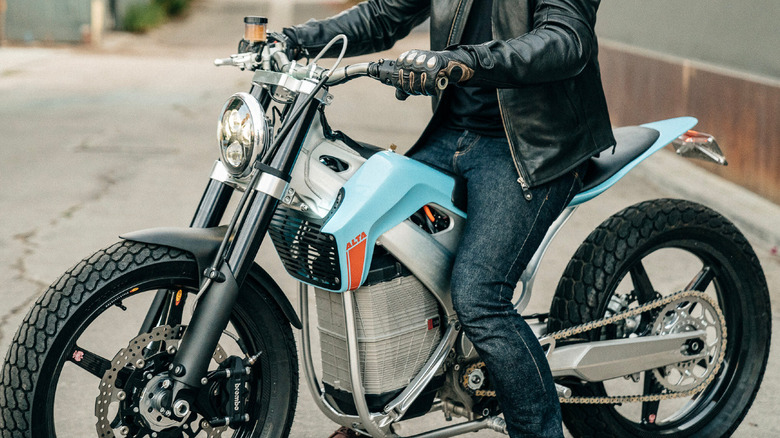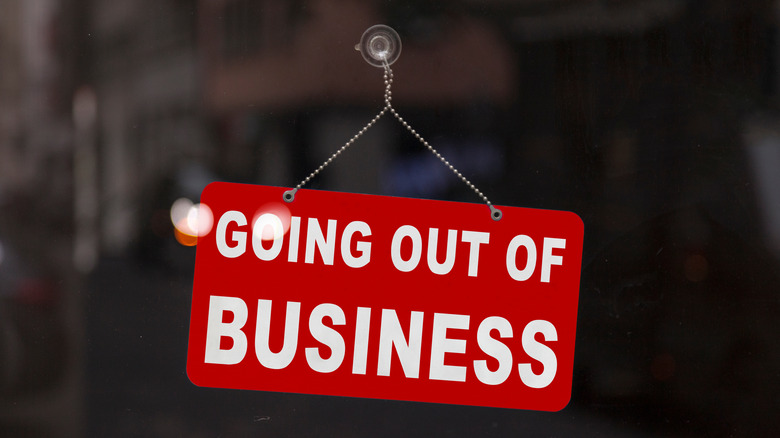Why One Of The Greatest Electric Motorcycle Companies Failed
In 2016, the Alta Motors Redshift MX made history by becoming the first electric motorcycle to earn the number one spot at the AMA EnduroCross racing event (via Dirt Rider). The Redshift MX also won the Geneva Supercross in 2017, beating the odds against a gas-powered motorcycle. The glory just kept coming, and Alta Motors made another impression at the Reno Endurocross. It was obvious that Alta Motors was trying to prove a point; it was in the business of making electric motorcycles that were just as good, if not better, than gas-powered motorcycles.
But a wave of dark clouds was forming on the horizon, and shortly after Alta Motors gained some traction in the motocross world, it packed its bags and closed up shop. "Our sincere gratitude goes to all those who have believed in Alta over the years", the company said in a farewell message on October 18, 2018. Since then, we haven't heard from Alta Motors. Of course, it begs the question — why did Alta Motors fail?
It ran out of funds
When Alta Motors was the new kid on the block, it raised capital totaling $8.2 million by 2014 –- this was back when it was known as BRD Motorcycles. By 2017, Alta Motors had fundraised $27 million to expand its production of electric motorcycles. Everything was going according to plan considering that Alta Motors sold 1,000 electric motorcycles in 2018 and it was scheduled to deliver 300 more units the same year (as reported by Electrek).
But behind the scenes, Alta Motors was struggling to stay afloat due to cash flow issues, and it was searching for more investors to finance its operations. Like most startups, Alta Motors failed to secure enough funding to sustain its manufacturing operations and it eventually closed down. By the time Alta Motors was winding down, it had secured about $45 million of capital funding (via TechCrunch), but that wasn't enough to save it.
A big deal falls through
When Alta Motors was looking for investors to jump on board, it just happened that Harley Davidson was planning to produce electric motorcycles. As a result, a "scratch my back, I scratch yours" opportunity presented itself — Harley-Davidson and Alta Motors struck a deal in March 2018. According to Reuters, Harley Davidson was going to invest in Alta Motors in exchange for Alta to develop electric motorcycles for it. Even though Harley Davidson didn't divulge the financial details of the deal with Alta, it had separately pledged to invest $25 to $50 million every year in electric motorcycle technology.
However, just six months after Harley-Davidson invested in Alta Motors, it reportedly pulled out of the deal. One week after the deal was supposedly scrapped, Harley-Davidson revealed plans to open its electric motorcycle research facility in Silicon Valley (via Auto Evolution). Unfortunately, Alta Motors couldn't find another investor on time, and it closed down a few weeks later. Harley Davidson eventually released its electric motorcycle and we reviewed it.
It's difficult to sell electric motorcycles
As reported by the New York Times, fewer Americans were buying motorcycles after the 2008 recession. Even Harley-Davidson, the biggest motorcycle manufacturer in the U.S., was experiencing a sales decline in the domestic market (via Reuters). Besides Alta Motors, other electric motorcycle brands such as Polaris and Arc Vector have quietly disappeared from the domestic market in the previous decade. Not to forget, Harley-Davidson's electric motorcycle, the LiveWire, was a flop, and it's one of the reasons its CEO resigned (via Business Insider).
According to John McInnis, a former employee at Alta Motors who is now working for Harley Davidson, the biggest obstacle to electric motorcycle adoption is "cultural aspect," since the older generations favor gasoline vehicles. It could be a while before electric motorcycles become mainstream, but electric bicycles have become more popular –- and even automakers such as Ford have ventured into the e-bike business. As for Alta Motors, we think it's not coming back considering that the company that bought its intellectual property (BRP) has no interest in reviving it.



